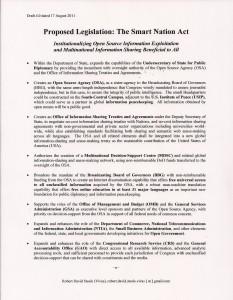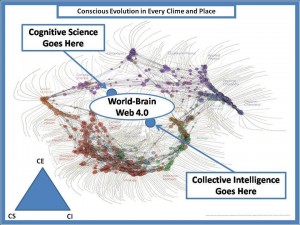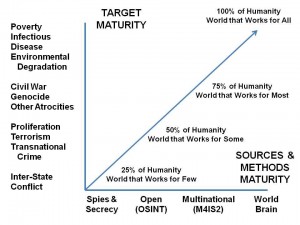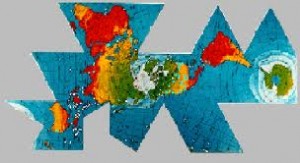
Non-Geek Digerati Anti-Intellectualism
Academia, Advanced Cyber/IO, Analysis, Civil Society, Collective Intelligence, Collective Intelligence, Corruption, Cultural Intelligence, History, info-graphics/data-visualization, IO Impotency, Key Players, Methods & Process, Misinformation & Propaganda, Policies, Policy, Politics of Science & Science of Politics, Power Behind-the-Scenes/Special Interests, Reform, Research resources, Serious Games, Standards, Threats, Tools, Waste (materials, food, etc)
Is there a new geek anti-intellectualism?
Is there a new anti-intellectualism? I mean one that is advocated by Internet geeks and some of the digerati. I think so: more and more mavens of the Internet are coming out firmly against academic knowledge in all its forms. This might sound outrageous to say, but it is sadly true.

Robert David STEELE Vivas: Digerati are not geeks. They are adept at social media, a process, rather than the substance of any discipline. Their scorn for the mandarins of knowledge would not be possible if academia had not lost its soul, sanctioned massive intellectual corruption, and fragmented itself to the point of irrelevance. The serious educational literature (not something the digerati read) is clear: inspiration and innovation

emerge faster, better, and cheaper from minds that are prepared, to include a foundation of memorization and a deep familiarity with the thinking of those who have come before. The digerati point of view half-right and is embodied in Smart Mobs, Wisdom of the Crowd, Everything is Miscellaneous, and Maria Popova's latest thought, that “information curation is the new authorship.” The digerati approach splits the roles of originator of an idea and connector of an idea down, and assumes that “the collective” can replicate and even surpass the individual human brain, without recognizing that the whole is only as good as the sum of the part foundation plus whatever the collective adds. My own finding re Wikipedia is that the mob destroys intellectuals. My own efforts to enhance the Open Source Intelligence page there were destroyed by idiots that “assumed” that because I pointed to oss.net so much (to many of the 800 people whose work is there including the 144 that received Golden Candle Awards) I was “self-promoting.” The digerati are fragile and very shallow, and by Larry Sanger's very interesting account, a new form of neo-Luddite. The academy is corrupt and fragmented–we are in an era where all forms of organization have lost their soul and whatever semblance of philosophical context they may once have possessed. We are suffering from the Paradigms of Failure that I discussed in the pre-amble to ELECTION 2008: Lipstick on the Pig (EIN, 2008). There is only one option leading to stabilization & reconstruction: INTEGRITY. The digerati aren't–as a general rule–very appreciative of holistic thinking or in-depth expertise–they are a spoiled generation badly in need of some personal suffering and exposure to global reality–IMHO.
In “borderless” cyberspace, nation states struggle — M4IS2 Anyone?
Advanced Cyber/IO, Analysis, Augmented Reality, Budgets & Funding, Collective Intelligence, Communities of Practice, Computer/online security, Corporations, Counter-Oppression/Counter-Dictatorship Practices, Cultural Intelligence, Earth Intelligence, Ethics, Geospatial, History, info-graphics/data-visualization, InfoOps (IO), Intelligence (government), Journalism/Free-Press/Censorship, Key Players, Methods & Process, Officers Call, Peace Intelligence, Policies, Policy, Politics of Science & Science of Politics, Real Time, Reform, Research resources, Serious Games, Standards, Strategy, Technologies, Threats, Tools, Whole Earth Review
Analysis: In “borderless” cyberspace, nation states struggle
By Peter Apps, Political Risk Correspondent
Reuters LONDON | Thu Jun 9, 2011
EXTRACT:
“The nature of cyberspace is borderless and anonymous,” R. Chandrasekhara, secretary of India's telecommunications department, told a cyber security conference in London last week organised by a U.S.-based think tank, the EastWest Institute. “Governments, countries and law — all are linked to territory. There is a fundamental contradiction.”
Tip of the Hat to Chris Pallaris at LinkedIn.
Phi Beta Iota: The national secret intelligence communities mean well, but they are cognitively and culturally incapacitated in relation to both the global threats and the global infomation sharing and sense-making possibilities. It may just be that the solution has to come from a private sector service of common concern that can provide the integrity now lacking in governments and most corporation. Scary thought. M4IS2 is inevitable….delay is costing trillions.
Directory of Leak Sites
Research resourcesCooperation Is Pledged By Nations Of the Arctic
06 Russia, 08 Wild Cards, Advanced Cyber/IO, Analysis, Budgets & Funding, Collective Intelligence, Communities of Practice, Earth Intelligence, Ethics, History, InfoOps (IO), Intelligence (government), Journalism/Free-Press/Censorship, Maps, Methods & Process, Open Government, Policies, Policy, Politics of Science & Science of Politics, Real Time, Reform, Research resources, Serious Games, Standards, Strategy, Technologies, Threats, Tools
Cooperation Is Pledged By Nations Of the Arctic
New York Times, May 12, 2011
NUUK, Greenland — The eight Arctic nations pledged Thursday to create international protocols to prevent and clean up offshore oil spills in areas of the region that are becoming increasingly accessible to exploration because of a changing climate.
The Arctic Council — the United States, Russia, Canada, Iceland, Denmark, Norway, Finland and Sweden — said the protocols would be modeled on a separate agreement signed here in Nuuk on Thursday to coordinate search-and-rescue operations over 13 million square miles of ocean.
Phi Beta Iota: This is potentially world-changing, but pedestrian at this time. Legal and logistics arrangements institutionalize old ways of doing things–slow, expensive, often inappropriate ways. Much more exciting would be for the nations to agree to create an Arctic M4IS2 Centre, perhaps based in Copenhagen or in Oslo, with an emphasis on sustainable energy and climate change to begin with, but rapidly filling out to provide holistic analytics across all threats and helpful to the harmonization of spending across all policies. Such a center could be innovative from the first day if it includes all eight tribes of intelligence in its organizational and outreach schema, creating a model for both the United Nations and for each of the continental political organizations.
WATER Central to Man Against Nature
Analysis, Budgets & Funding, Communities of Practice, Corruption, Earth Intelligence, Geospatial, History, InfoOps (IO), IO Impotency, Methods & Process, Policies, Politics of Science & Science of Politics, Power Behind-the-Scenes/Special Interests, Reform, Research resources, Secrecy & Politics of Secrecy, Strategy, ThreatsHeadlines, Comment, and Lists of Book Reviews Below the Line…
Journal: Cheery Waves Flags How Supercomputers Alter Science
Advanced Cyber/IO, Analysis, Augmented Reality, Communities of Practice, Earth Intelligence, Geospatial, History, info-graphics/data-visualization, IO Mapping, IO Sense-Making, Key Players, Maps, Methods & Process, Mobile, Policies, Policy, Politics of Science & Science of Politics, Real Time, Research resources, Serious Games, Standards, Strategy, Technologies, Threats, Tools, True Cost, Waste (materials, food, etc)
Digging Deeper, Seeing Farther: Supercomputers Alter Science
By JOHN MARKOFF
New York Times, April 25, 2011
SAN FRANCISCO — Inside a darkened theater a viewer floats in a redwood forest displayed with Imax-like clarity on a cavernous overhead screen.
The hovering sensation gives way to vertigo as the camera dives deeper into the forest, approaches a branch of a giant redwood tree, and then plunges first into a single leaf and then into an individual cell. Inside the cell the scene is evocative of the 1966 science fiction movie “Fantastic Voyage,” in which Lilliputian humans in a minuscule capsule take a medical journey through a human body.
There is an important difference — “Life: A Cosmic Journey,” a multimedia presentation now showing at the new Morrison Planetarium here at the California Academy of Sciences, relies not just on computer animation techniques, but on a wealth of digitized scientific data as well.
Comment and Seven Graphics Below the Line…
Continue reading “Journal: Cheery Waves Flags How Supercomputers Alter Science”

